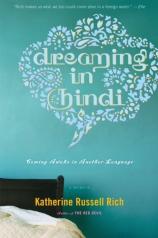Reading Group Guide
Discussion Questions
Dreaming in Hindi: Coming Awake in Another Language

1. At the opening of the book, Rich’s life is falling apart: she’s just lost a job, isn’t sure she wants to continue working in the same industry she’s always been in, is rebounding from cancer but on “perpetual alert” against another seige. Why do you think she chooses to learn a language at that particular conjuncture? Is it an act of defiance? Evasion? Passion? Or none of these things?
2. Throughout the book, Rich plays language against science. Why do you think she chose this structure? What do the two halves of the split represent? Mind/body? East/West? How do they symbolize what was going on in her life? How are the two halves reconciled at the end of the book?
3. What benefits does a structure like this have? Are there ways it doesn’t work?
4. Nine-eleven happens on the fifth day of classes, but Rich doesn’t reveal this fact right away. Why do you think she waits to disclose it? In what other ways does she deviate from a straightforward chronology, and why do you think she decided not to write one?
5. The novelist Jayne Anne Phillips described Dreaming in Hindi as “a funny, deeply humane journey of words.” A number of reviewers have remarked on the humor. Do you think humor is universal? What was Rich’s experience with this?
6. Early on, she goes to live with an extended Jain family toward whom she felt a great amount of fondness. What ultimately caused her to leave?
7. Who is the hero of the book? Is there more than one?
8. Dreaming in Hindi contains a number of portraits of Indian women living in one of the most conservative states in India, in a city where a substantial number of women are still in pardah. How does Rich, an independent Western woman, adjust to social conditions? In what was ways does she not?
9. In the book, we learn that there’s no word for privacy in any of the Indian languages. What other Western concepts does Rich find are missing? Which particularly Indian ones does she come to embrace?
10. The book presents the argument that a second language has an effect on the self. Do you agree that language influences the way you see the world? What have been your experiences with this? What do you think about the claim that different languages engender different emotions?
11. Discuss the very last line in the book, where the deaf school teacher Anukul answers a question that Rich has long entertained. Why do you think she decided to end on this?
Dreaming in Hindi: Coming Awake in Another Language
- Publication Date: June 10, 2010
- Paperback: 384 pages
- Publisher: Mariner Books
- ISBN-10: 0547336934
- ISBN-13: 9780547336930






